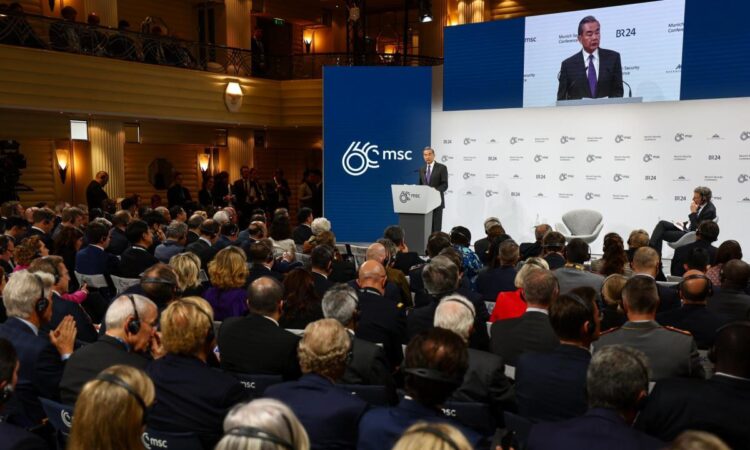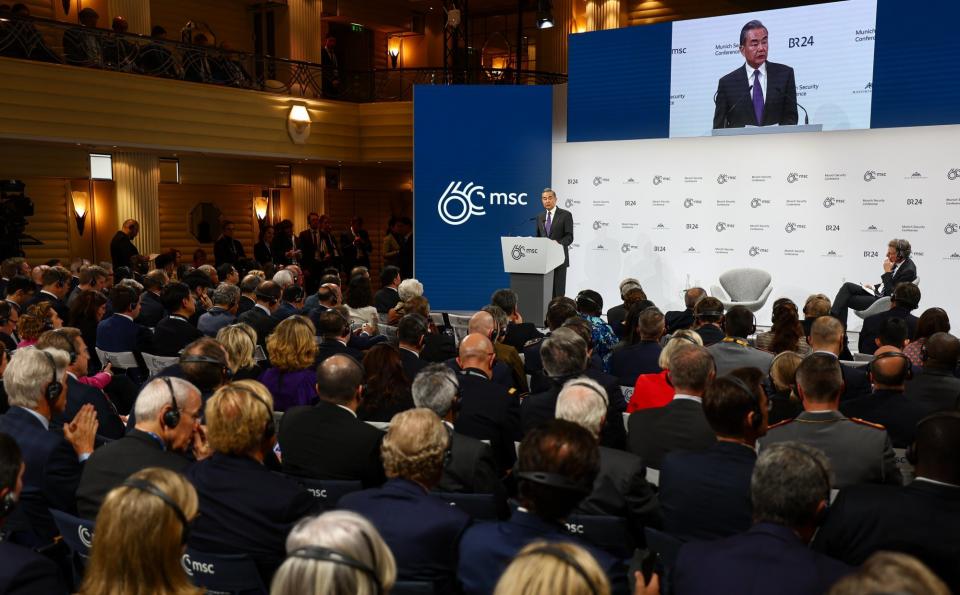
Opened in 1841 and almost completely destroyed by British bombs in 1944, the old Hotel Bayerischer Hof in Munich has seen its fair share of ghosts.
Over the last weekend, however, it was haunted by the possibility of a different sort of spectre.
Donald Trump, the former US president and presumptive Republican nominee for November’s US election was not at the 60th Munich Security Conference but his absence loomed over it, percolating through tense conversations about Ukraine, Gaza and Europe’s ability to provide for its own security.
Do you have questions about the biggest topics and trends from around the world? Get the answers with SCMP Knowledge, our new platform of curated content with explainers, FAQs, analyses and infographics brought to you by our award-winning team.
On Friday, United States Vice-President Kamala Harris tried to reassure Europeans rattled by Trump’s potential comeback and following his vow on February 10 that he would “encourage” Russia to attack members of Nato who had not met their financial obligations.
“In these unsettled times, it is clear: America cannot retreat. America must stand strong for democracy. We must stand in defence of international rules and norms, and we must stand with our allies,” Harris said.
On Sunday, however, an alternative picture of the future was painted by J.D. Vance, a Republican Senator for Ohio, who said he “can’t speak for Donald Trump … but I think that [Trump] agrees with what I’m going to say”.
“I don’t think we should pull out of Nato and no, I don’t think we should abandon Europe. But yes, I think that we should pivot, the United States has to focus more on East Asia. That is going to be the future of American foreign policy for the next 40 years, and Europe has to wake up to that fact,” Vance told the conference known as the “Davos of Defence”.
Against this backdrop, China fell down the summit’s agenda and its officials were less visible than in previous years. Nonetheless, a sizeable Chinese delegation worked the margins at Munich, taking part in private and public events, looking to capitalise on Europe’s horror at America’s potential retreat from the continental theatre.
“No matter how the world changes, China is a responsible major country [that] will keep its major principles and policies consistent and stable … In a turbulent world China will be a force for stability,” Foreign Minister Wang Yi told the audience on Saturday.
While the speech was loaded with thinly-veiled barbs directed at the US and implied threats not to cross China’s red line, Taiwan, observers thought it was softer in tone than that given by Wang a year earlier, owing to a relative thaw in bilateral ties.

Wang Yi delivers a speech at the Bayerischer Hof hotel, the venue of the 60th Munich Security Conference (MSC), on February 17. Photo: EPA-EFE alt=Wang Yi delivers a speech at the Bayerischer Hof hotel, the venue of the 60th Munich Security Conference (MSC), on February 17. Photo: EPA-EFE>
People in the room said that when Wang talked about “promoting China-US relations along the lines of mutual respect”, his gaze was fixed on American officials in the audience.
“We’re at a moment where we see cooperation, competition and rivalry in different doses but all across the agendas,” former Spanish foreign minister Arancha Gonzalez told the South China Morning Post on the sidelines of the event.
“You can say on China’s behaviour vis-a-vis Russia there was a bit of different tonality from Wang Yi here … he did not talk about an unlimited partnership with Russia.”
Beijing sent three delegations to the Bavarian capital, sources said, one led by Wang, a second group of military officials and a third group of think tankers and academics spearheaded by Fu Ying, a former foreign vice-minister.
In a diplomatic flurry, Wang met at least 10 foreign ministers, including US Secretary of State Antony Blinken and Ukraine’s Dmytro Kuleba, and a number of world leaders, with Germany’s Olaf Scholz and Serbia’s Alexander Vucic among them.
Behind closed doors, other Chinese delegates met and spoke alongside European academics and lawmakers who have been sanctioned by Beijing, and in some cases discussed ways in which the sanctions might be lifted.
In a dimly lit room deep in the belly of the Bayerischer Hof, the state-backed Centre for China and Globalisation (CCG), a think tank, hosted a round table encouraging “Climate Cooperation in an Era of Great Power Politics”.
This discussion on how China, the EU and US can “embrace trilateral climate cooperation … in the current tense geopolitical environment” was attended by a gaggle of Western officials and academics, including Germany’s special envoy on climate Jennifer Morgan, and noted historians Niall Ferguson and Graham Allison.
“I think the climate is probably the most common threat to mankind and I hope we can go beyond the geopolitical differences … we have to work together,” said Huiyao Wang, president of the CCG.
Hildegard Bentele, a German member of the European Parliament who has previously spoken out against Europe’s dependence on China for critical minerals, said she would “advocate at the European Union … to go more actively for global cooperation, also with China”.
“I hope there will be more activities in international negotiations, and also on a permanent basis with China,” Bentele said.
Above ground though, things were a little testier.
The co-chair of the German Social Democratic Party, Lars Klingbeil, became embroiled in a heated exchange with former diplomat Fu when warning Beijing not to attack Taiwan.
“Attacking Taiwan will completely change our relationship with China, and we’re absolutely clear on this,” Klingbeil said.
“You said Taiwan and Ukraine are different questions, and I would agree, but I think both are about the question: do we have a multilateral rules-based order?” he told Fu.
“Is it normal to change borders with military action? That has to be a clear ‘no’, it’s not OK to change borders by military action.”
His remarks earned a stern rebuke from Fu, who said: “I need to start by correcting Mr Klingbeil, between the mainland and Taiwan is not an international border.”
Foreign Minister Wang dismissed questions from a moderator on Taiwan and the South China Sea, laughing in his face when he asked if China would accept a “code of conduct” for the region.
In private events too, discussions got heated over the self-governing island. In one instance, a prominent EU lawmaker became involved in a full-throated dispute with a Chinese academic over the issue, according to people present.
On another sensitive subject, Fu was asked whether she knew the whereabouts of former foreign minister Qin Gang, who disappeared from public view in June before being stripped of his role.
“Since you are from The Washington Post I guess you know him better than I do,” Fu told the reporter. “And since you are a journalist I am sure you’ve heard the Chinese foreign ministry spokesperson response, you don’t need me to repeat it.”
China’s close ties with Russia were a subtext to many of the conference’s discussions.
“In the conversations that I have had, geopolitics is absolutely front of mind. China is part of that, Russia is part of that … I find that they are very nuanced in how the different global players are being seen,” EU competition chief Margrethe Vestager told reporters on the sidelines of the event.
Despite Wang’s meeting with Ukrainian Foreign Minister Kuleba, in which he vowed not to “sell lethal weapons” to either side in the war with Russia, China’s relationship with Moscow was invoked as a red flag throughout the weekend.
A series of European officials, including the commission president Ursula von der Leyen, warned that China was watching whether the West remained united on Ukraine.
“All the other autocratic adversaries … are watching very closely whether the democracies stand united,” she said.
As well as geopolitics, Gonzalez, the former Spanish foreign minister, said overcapacity in the Chinese economy was a major barrier to cooperation with China.
“There is a space for everyone because we need to decarbonise the world, but if there’s no fairness in the trading conditions, it will be done in an uncooperative manner, which will result in unilateral measures being taken to manage that,” she said.
“This is the message the EU has been sending to China, [do something about overcapacity] or we will have to use the instruments at our disposal to fight against what Europe perceived as unfair conditions.”
This article originally appeared in the South China Morning Post (SCMP), the most authoritative voice reporting on China and Asia for more than a century. For more SCMP stories, please explore the SCMP app or visit the SCMP’s Facebook and Twitter pages. Copyright © 2024 South China Morning Post Publishers Ltd. All rights reserved.
Copyright (c) 2024. South China Morning Post Publishers Ltd. All rights reserved.






